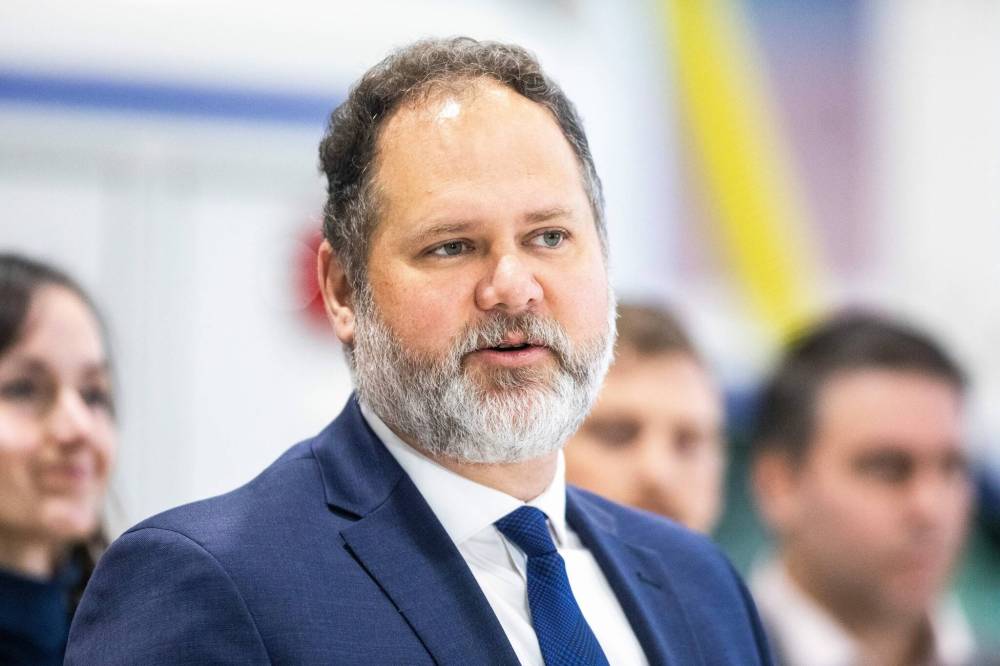Province to expand law on sharing of intimate images
Advertisement
Read this article for free:
or
Already have an account? Log in here »
To continue reading, please subscribe:
Monthly Digital Subscription
$0 for the first 4 weeks*
- Enjoy unlimited reading on winnipegfreepress.com
- Read the E-Edition, our digital replica newspaper
- Access News Break, our award-winning app
- Play interactive puzzles
*No charge for 4 weeks then price increases to the regular rate of $19.00 plus GST every four weeks. Offer available to new and qualified returning subscribers only. Cancel any time.
Monthly Digital Subscription
$4.75/week*
- Enjoy unlimited reading on winnipegfreepress.com
- Read the E-Edition, our digital replica newspaper
- Access News Break, our award-winning app
- Play interactive puzzles
*Billed as $19 plus GST every four weeks. Cancel any time.
To continue reading, please subscribe:
Add Free Press access to your Brandon Sun subscription for only an additional
$1 for the first 4 weeks*
*Your next subscription payment will increase by $1.00 and you will be charged $16.99 plus GST for four weeks. After four weeks, your payment will increase to $23.99 plus GST every four weeks.
Read unlimited articles for free today:
or
Already have an account? Log in here »
The Manitoba government plans to broaden the law governing the non-consensual distribution of intimate images to include nearly nude pictures and threats to share the material.
The bill before the legislature would also compel websites to remove the images.
Justice Minister Matt Wiebe said Thursday the proposed changes are part of a set of 10 recommendations put forth in a review from the Crown law analysis branch of the justice department last year.

MIKAELA MACKENZIE / FREE PRESS FILES
Manitoba Justice Minister Matt Wiebe Thursday the proposed changes are part of a set of 10 recommendations based on a review from the Crown law analysis branch of the justice department.
“This is an evolving space. We know that there’s always work to be done, but this really does address those recommendations and it brings us to the forefront where we should be in Manitoba about protecting children,” he said.
In Tuesday’s throne speech, the government vowed to bolster the current law and make it the “strongest in Canada.”
Wiebe said when it comes to forcing websites to take down intimate images, it’ll be up to the companies to follow legislation in each jurisdiction they operate in and be willing to work with local governments.
There wouldn’t be a penalty, per se, and it would be up to the courts to decide the matter, the minister said.
The amendments would make it illegal to take or share nude or nearly nude images of a person after their death.
Kalyn Danco, associate general counsel for the Canadian Centre for Child Protection, said the rapid evolution of the internet and sharing of images makes the issue difficult to address, which means policy responses need to adapt quickly.
“Our organization has been advocating for stronger protections for victims of this form of sexual violence, and so we are encouraged to see the Manitoba government is listening and taking action.”
The centre runs a national tip line where people can report online child sexual abuse and exploitation, and it receives hundreds of reports each year of images being shared without consent.
She said the inclusion of a threat to release an image is an important amendment. Once an image has been distributed, containing it can be incredibly difficult. The threat of distribution can be used as a coercive control tactic.
“It’s very important to acknowledge the harm from that type of threat, that type of extortion,” Danco said.
The law has had recent amendments to address the issue of revenge porn. In June 2024, Bill 24 — the Intimate Image Protection Amendment Act (Distribution of Fake Intimate Images) came into force.
It added “fake intimate image,” sometimes known as a deepfake, to the definition of an intimate image. It addressed the distribution of fake intimate images created by technology that appears to depict identifiable people as being nude or engaged in sexual activity.
The amendments enable any person depicted in a fake intimate image to sue the person who distributed it without their consent.
During the federal election in April, Prime Minister Mark Carney vowed to raise the penalty for distributing intimate images without consent and make it a criminal offence to share non-consensual sexual deepfakes.
The government also announced the centre will receive $20,000 for online prevention programs. The money will come from the federal proceeds of crime fund.
— with files from The Canadian Press
nicole.buffie@freepress.mb.ca

Nicole Buffie
Multimedia producer
Nicole Buffie is a reporter for the Free Press city desk. Born and bred in Winnipeg, Nicole graduated from Red River College’s Creative Communications program in 2020 and worked as a reporter throughout Manitoba before joining the Free Press newsroom as a multimedia producer in 2023. Read more about Nicole.
Every piece of reporting Nicole produces is reviewed by an editing team before it is posted online or published in print — part of the Free Press‘s tradition, since 1872, of producing reliable independent journalism. Read more about Free Press’s history and mandate, and learn how our newsroom operates.
Our newsroom depends on a growing audience of readers to power our journalism. If you are not a paid reader, please consider becoming a subscriber.
Our newsroom depends on its audience of readers to power our journalism. Thank you for your support.

